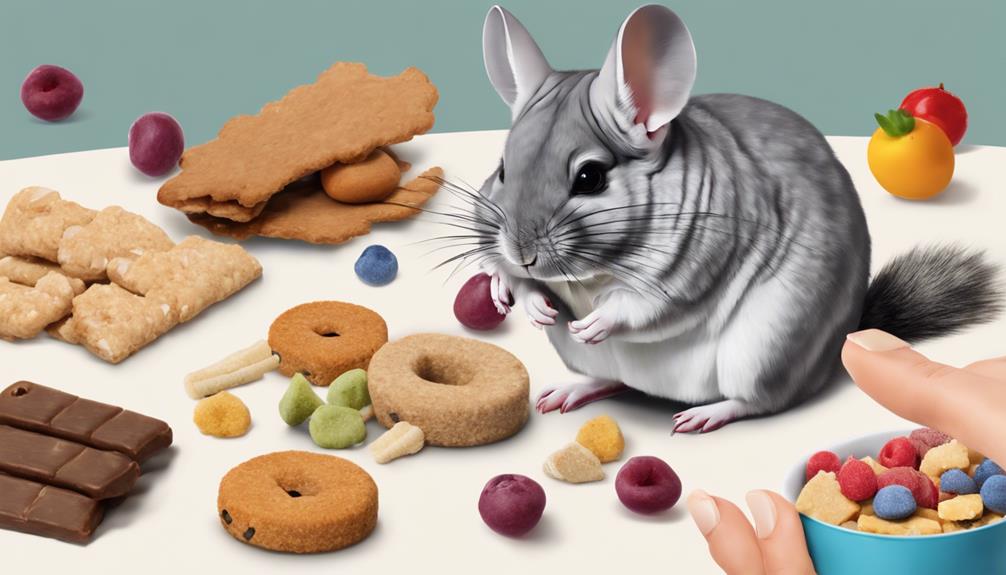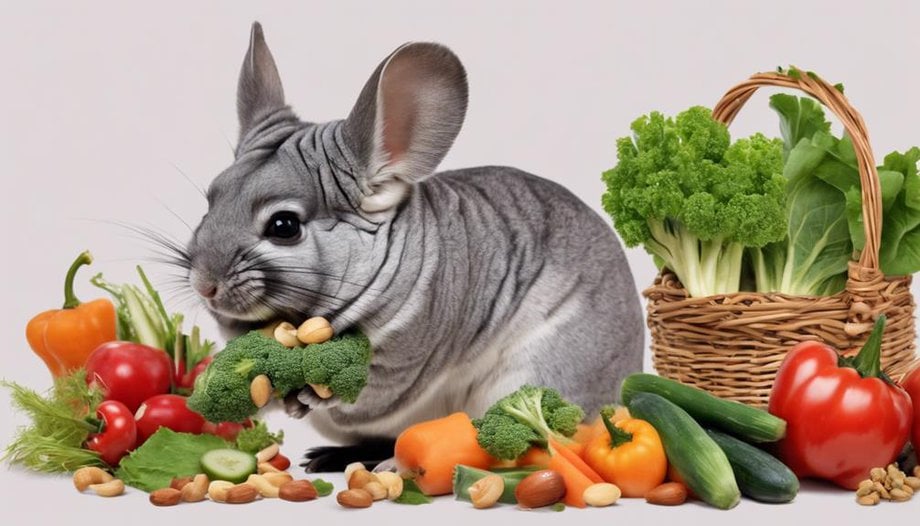How to Avoid Common Nutritional Mistakes With Chinchillas

Chinchillas are cute and fluffy animals that make great pets. However, when it comes to their diet, there are some common mistakes that chinchilla owners make which can have a negative impact on their health. One of the most common mistakes is feeding them a diet that is too high in fat. Chinchillas have sensitive digestive systems and too much fat can lead to obesity and other health issues. Another mistake is giving them treats that are high in sugar. Chinchillas are prone to dental problems, and sugary treats can contribute to tooth decay. It's important to provide them with a diet that is high in fiber and low in fat and sugar. Hay should make up the majority of their diet, along with a small amount of specially formulated chinchilla pellets. Fresh water should always be available, and treats should be given sparingly. By avoiding these common nutritional mistakes, you can help ensure that your chinchilla stays healthy and happy.
Remember, always consult with a veterinarian or a chinchilla expert for specific dietary recommendations for your pet.
Proper Pellet Selection
Selecting the right pellets for your chinchilla is important for maintaining its health and well-being. When considering pellet variety options, always opt for high-quality brands that are specifically formulated for chinchillas. These pellets should be the mainstay of your chinchilla's diet, providing essential nutrients and vitamins necessary for its overall health.
Nutritional balance considerations are paramount when choosing pellets for your furry friend. Make sure that the pellets offer a balanced mix of fiber, protein, fat, and essential vitamins and minerals. Avoid pellets that are high in fat or sugar, as they can lead to obesity and other health issues in chinchillas.
Hay Quality and Quantity
Selecting the right type of hay is important for your chinchilla's health. Make sure that you provide the correct portion size to meet their dietary needs.
Proper hay storage is essential to maintain freshness and prevent mold growth.
Hay Type Selection
When selecting hay for your chinchilla's diet, it's important to prioritize quality over quantity to guarantee excellent nutrition and health. Remember that the type of hay you choose plays an essential role in your pet's well-being. Here's a quick guide to help you make the best hay selections:
- Hay variety options: Explore different types of hay such as Timothy hay, orchard grass hay, or botanical hay to provide a variety of nutrients and textures for your chinchilla.
- Hay feeding schedule: Make sure your chinchilla has a constant supply of fresh hay available 24/7 to support their digestive health and keep them mentally stimulated.
- Quality over quantity: Opt for fresh, fragrant hay that's free from dust and mold, even if it means purchasing smaller quantities more frequently.
Proper Hay Portion
Prioritize the quality of hay over the quantity to guarantee the best nutrition and health for your chinchilla. Hay consumption plays a crucial role in your chinchilla's digestion and overall well-being.
Make sure your chinchilla has access to fresh, high-quality hay at all times to support its digestive system and maintain proper dental health. The nutritional benefits of hay are vast, providing essential fiber to aid in digestion and keep your chinchilla's teeth worn down.
Hay Storage Tips
For highest chinchilla health and well-being, make sure that the hay you store is of the top quality and maintained in the right quantities. Proper hay storage solutions and maintenance are important for your chinchilla's nutrition and overall happiness. Here are some key tips to help you guarantee your chinchilla receives the best:
- Store hay in a dry and well-ventilated area: Moisture can lead to mold growth, which can be harmful to your chinchilla.
- Use a hay rack or feeder: This helps prevent your chinchilla from soiling the hay and keeps it clean for consumption.
- Rotate hay regularly: Make sure that the hay provided is fresh and free from dust or pests.
Fresh Water Availability
Guaranteeing a constant supply of fresh water for your chinchilla is paramount to their health and well-being. When it comes to water bottle placement, make sure it's securely attached to the side of the cage at a height that allows easy access for your furry friend. This will help prevent any spills or contamination, making sure that your chinchilla always has access to clean water.
Additionally, consider offering water bowl options in addition to the water bottle. Some chinchillas may prefer to drink from a bowl rather than a bottle, so providing both guarantees that your chinchilla stays well-hydrated. You need to monitor the water levels daily and clean the water bottle and bowl regularly to prevent any bacterial growth or contamination.
Limited Treats Intake

With the foundation of proper hydration in place, now focus on maintaining your chinchilla's well-being by carefully managing their intake of treats. Treats are a delightful addition to your chinchilla's diet, but moderation is key to a healthy lifestyle.
Here's how you can guarantee your chinchilla enjoys treats without compromising their health:
- Mind the Frequency and Portion Size: Limit the frequency of treats to avoid unbalancing their diet. Small portions given occasionally will keep your chinchilla happy without causing harm.
- Choose Healthy Snack Options: Opt for chinchilla-safe treats like hay-based treats, dried herbs, or a small piece of apple. These options provide essential nutrients while satisfying your pet's cravings.
- Monitor the Impact: Watch for any changes in your chinchilla's behavior or digestion after introducing treats. Adjust the frequency or type of treats based on their response to guarantee their well-being.
Vitamin and Mineral Supplements
When considering your chinchilla's dietary needs, incorporating vitamin and mineral supplements is essential for maintaining their overall health and vitality. The correct supplement dosage is critical to prevent deficiencies or excess, both of which can harm your chinchilla. It's wise to consult with a veterinarian experienced in chinchilla care to determine the appropriate supplement dosage tailored to your pet's specific needs.
Additionally, offering a variety of supplements guarantees that your chinchilla receives a well-rounded intake of essential vitamins and minerals. Different supplements cater to different needs, so a diverse selection can help address various nutritional requirements your chinchilla may have. Remember, the key is moderation and balance when it comes to supplement variety. By providing the right amount and types of supplements, you're actively contributing to the well-being and longevity of your cherished chinchilla.
Avoiding High-Sugar Foods

You must understand the importance of a sugar-free diet for your chinchilla's well-being.
High-sugar foods can have a significant impact on your chinchilla's health, leading to potential issues.
Be mindful of what you feed your chinchilla to guarantee a balanced and healthy diet.
Sugar-Free Diet Importance
Opt for a sugar-free diet to safeguard the health and well-being of your chinchilla. When it comes to your furry friend's nutrition, always remember the importance of maintaining a diet free from sugar.
Here are some essential points to contemplate:
- Sugar free snacks: Choose treats that are free from added sugars to prevent health issues in your chinchilla.
- Nutritional balance: Guarantee your chinchilla's diet is well-rounded and provides all the necessary nutrients for peak health.
- Healthy habits: Establish a routine that prioritizes wholesome, sugar-free foods to promote longevity and vitality in your beloved pet.
Impact on Chinchillas
To guarantee the prime health and longevity of your chinchilla, prioritizing a diet free from high-sugar foods is paramount. Maintaining a nutritional balance is essential for chinchilla behavior and overall well-being. High-sugar diets can lead to obesity, diabetes, and digestive issues, impacting your pet's quality of life. Ensuring dietary variety is key for chinchilla digestion, promoting a healthy gut and preventing gastrointestinal complications. By offering a diverse range of hay, pellets, and limited treats, you can support your chinchilla's nutritional needs and prevent potential health risks. Remember, a well-balanced diet not only influences physical health but also plays an important role in your chinchilla's behavior and happiness.
| Nutritional Balance | Chinchilla Behavior | Dietary Variety | Chinchilla Digestion |
|---|---|---|---|
| Essential for health | Influences well-being | Key for digestion | Promotes gut health |
Monitoring Weight and Health
In order to guarantee the well-being and longevity of your chinchilla, vigilantly monitoring its weight and overall health is essential. Keeping a watchful eye on these aspects guarantees that your furry companion stays healthy and happy for years to come. Remember, prevention is key when it comes to your chinchilla's well-being.
Here are some tips to help you effectively monitor your chinchilla's weight and health:
- Regularly weigh your chinchilla and keep track of any fluctuations.
- Watch for signs of illness such as lethargy, changes in appetite, or fur abnormalities.
- Schedule routine check-ups with a veterinarian specializing in exotic pets to address any health concerns promptly.
Frequently Asked Questions
Can Chinchillas Eat Fruits and Vegetables as Treats?
Yes, chinchillas can enjoy fruits and vegetables as treats, but remember to maintain nutritional balance. Offer safe portion sizes based on chinchilla preferences. Treat options like apples and carrots can be great choices for a happy chinchilla.
How Often Should Chinchillas Have Their Teeth Checked by a Veterinarian?
Regular veterinary check-ups are important for your chinchilla's dental health. Prevention is key to avoiding issues. Make sure teeth are examined by a professional to catch any problems early. Trust in the importance of veterinary care for your beloved pet.
Are There Any Specific Brands of Pellets That Are Recommended for Chinchillas?
In selecting pellets for chinchillas, prioritize high-quality brands rich in essential nutrients. Consider your chinchilla's dietary preferences and taste preferences when choosing. Opt for pellets with a balanced nutritional content to support your pet's well-being.
Can Chinchillas Be Fed Commercial Chinchilla Treats in Moderation?
In moderation, you can offer commercial chinchilla treats. Guarantee treat frequency is restricted to maintain nutritional balance. Remember, treats should complement a well-rounded diet. Prioritize your chinchilla's health by choosing high-quality treats sparingly for their well-being.
How Can I Tell if My Chinchilla Is Overweight and in Need of a Diet Change?
In the journey of caring for your chinchilla, observe their physique like a hawk soaring over the land. If they seem rounder than a full moon, it's time for weight management, portion control, and boosting their exercise to keep them sprightly.










